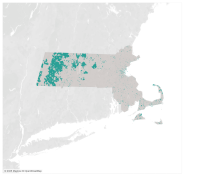The OpenCape Network launched about eight months ago to bring better middle mile connectivity to Cape Cod. Reporter Sean Gonsalves explored other possibilities for the 350-mile infrastructure in a recent Cape Cod Online article.
Gonsalves spoke with OpenCape CEO Dan Vorthems. The network was funded with $32 million in American Recovery and Reinvestment Act (ARRA) grants and approximately $8 million in funds from the state, county, and private-sector partner CapeNet. It brings connectivity to 91 community anchor institutions from Provincetown as far west as Providence and Brockton. The idea for the network began with Cape Cod Community College and Woods Hole Oceanographic Institute. Today, OpenCape is a non-profit with Board members from healthcare, higher education, public education, government, and the private sector.
Gonsalves and Vorthems touched on the high hopes for economic development that accompanied the network deployment. When the project began, the dream was to turn Cape Cod into a "Silicon Sandbar." The network is still in its infancy, but new jobs in the area are retail, service, and tourist related rather than high-tech. Residents of Cape Cod were hoping the network would bring better paying positions to meet the high cost of living in the area.
Gonsalves takes it one step further and proposes using the network for last mile connections:
Getting the Cape's big data users online opens up all sorts of possibilities. But [what] I wanted to know is when the Cape would get to the point where residential users could access this Internet autobahn capable of reaching speeds of a gigabit per second.
Once that happens, the Cape suddenly becomes a really attractive place for tech-savvy entrepreneurs, small business start-ups, and potential work-from-home employees who now spend hours commuting off-Cape. In the super high-speed tech world, they call that "the last mile."
Governor Patrick expressed his intention to bring better connectivity to underserved communities in his State of the Commonwealth address in January. There are a good number of underserved communities in Massachusetts, especially on the western side of the state, so Vorthems does not anticipate large amounts of state funding to find its way to Cape Cod.
There is a group working to optimize the asset that is already in place. From the article:
In the last few years, an ad hod group called Smarter Cape Partnership — comprising Open Cape, the Cape Cod Commission, Cape Cod Chamber of Commerce, the Cape Cod Technology Council and the Cape Cod Young Professionals — have been working to establish plans to develop shared work spaces for technology oriented start-ups.
…
"We've been approached by a number of organizations who are interested in doing fiber-to-the-home projects here," he said. "It's a very exciting time."






